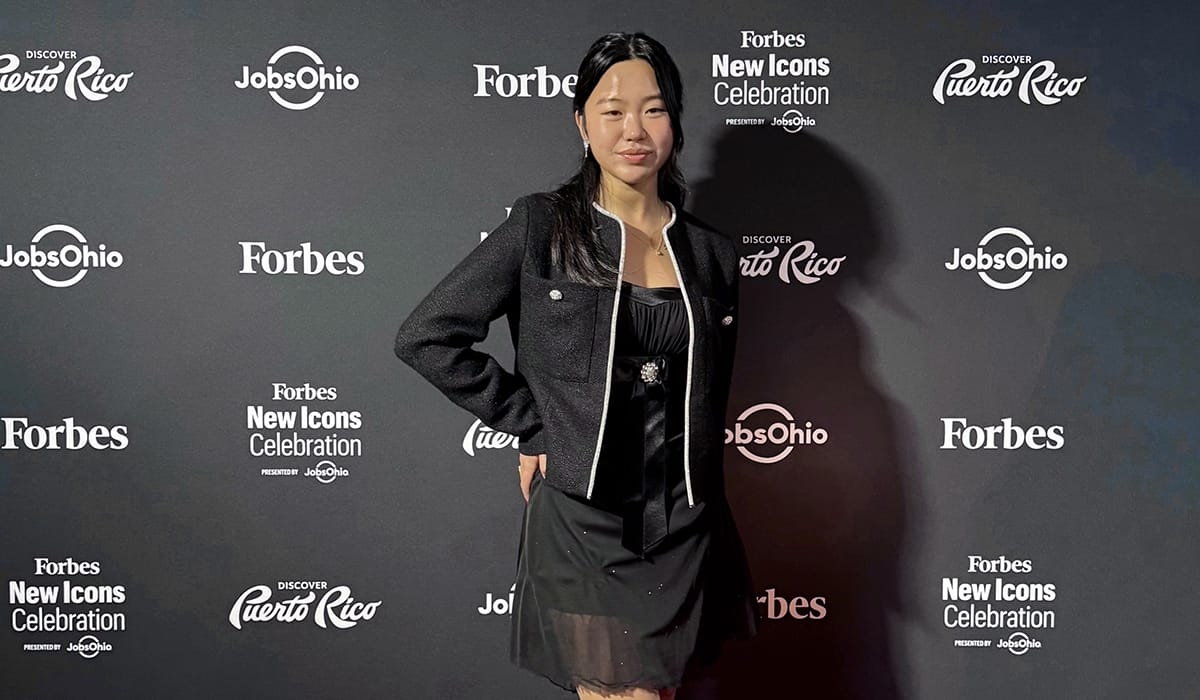USING SCIENCE TO IMPROVE THE LIVES OF INCARCERATED PEOPLE

Meet Daily Point of Light Award honoree Emily Cho. Read her story, and nominate an outstanding volunteer or family as a Daily Point of Light.
Emily Cho sees everyone’s potential, no matter their circumstances. While she’s only 18 years old, Emily’s dedication to helping the lives of incarcerated people started several years ago. Along with a group of her middle school classmates, Emily visited detention facilities and provided mentorship and hands-on learning opportunities to the people there and their families.
In 2019, she founded Juvie for STEM to resolve the growing issue of educational disparities in prisons, specifically aiming to help the youth in juvenile detention and children of the incarcerated by fostering an interest in STEM. Lessons in math, coding and science prepare students to obtain GEDs and subsequently decrease recidivism and increase prospective career and academic opportunities. Past students have gone on to bright futures where they pursue higher education and enter the working world.
As the founder and CEO of Juvie for STEM (also referred to as J STEM), Emily has a lot on her plate. Now a first-year engineering student at Cornell University, she still volunteers with Juvie for STEM anywhere from 150 to 200 hours per month. But Emily has also passed the torch to teach others how to carry the message, as well. With 36 chapters on six continents and over 7,000 volunteers in the mix, Juvie for STEM is the largest youth-led technology organization that endeavors to bring STEM education to correctional facilities.
While its influence is undeniable, Juvie for STEM wouldn’t exist without Emily’s original idea to simply get out there and volunteer with her classmates inside detention facilities. Her journey from young student with a bold idea to thriving founder and CEO is a strong example of how volunteering can transform the future.

What inspires you to volunteer?
I think the biggest gift that I have as a middle-class American from an immigrant family with really good access to education is being able to pay it forward to the community through service. That’s kind of the model that I like to follow. That’s why I always motivate myself to volunteer.
What inspired you to get started with this initiative?
Growing up, I was interested in the psychology of people in the criminal justice system. I started volunteering in prisons during middle school, and I met a lot of people who I thought had a lot of potential but lacked the opportunity and access to quality education. Because I grew up in a household where education is really important, and in an immigrant family, I’ve experienced how education is so important for changing one’s life. It’s almost non-existent in these prisons or detention facilities. I also saw a lot of kids, especially the children of incarcerated people or kids in juvenile detention centers, who didn’t have any educational opportunities. I wanted to create a little spark in them to get them intrigued by studying the sciences.
So that’s kind of why I created J STEM– to get them interested in science.
What are your long-term plans or goals for the organization?
In an ideal world, our goal is to eliminate educational disparities. We have a chapter in almost every state in America. Right now, we’re kind of working toward going international, but the biggest issue that we’re having is finding a director to add to our board who is both fluent in English and the other country’s native language.
What’s been the most rewarding part of your work?
Seeing how students get excited about science is fun for me, because I had that experience when I first started learning how to code. When I see someone really interested in the sciences or math or whatever they’re doing, it’s exciting and truly rewarding.
What have you learned through your experiences as a volunteer?
The biggest thing is that the negative stereotypes surrounding these facilities are false. It’s over-generalizing them, because every individual in there is very unique, and you don’t know what circumstance led to them getting there. The second thing is probably that everyone has potential, but it’s the lack of opportunities that makes a difference.
Tell us about future partnerships, programs or events that you are excited about.
We’re excited about working with brands, such as calculator companies, school supply companies and other nonprofit organizations that are trying to help us be able to bring in laptops. We’re also in talks with labs where some of their kit and tools aren’t functioning for their research, but are working to the point where we can still use them in our programming.
Why is it important for others to get involved with causes they care about?
Once you care about something, there’s a passion you have that other people who aren’t interested in just can’t replicate, even if they try. I think passion is the one thing that truly differentiates a successful person. I think the people who are passionate about it should act as the leaders, even if they don’t feel like one, because that passion will come out on its own.
Once you give this passion back to the community, you can see a noticeable change. If everyone did this, society in itself would just be so much more advanced.
What do you want people to learn from your story?
I think I want people to understand the importance of education and that it is a powerful tool to break incarceration and poverty patterns. Just because a child is in a correctional facility doesn’t mean that they’re a lost cause. For example, once they get the guidance and opportunities that they need, then they can truly be one of the most successful people that you’ll ever meet.
Do you want to make a difference in your community like Emily? Find local volunteer opportunities.
